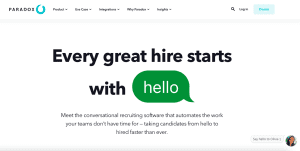As tech recruiting, in general, has become an increasingly competitive field, specialist roles are particularly challenging. So much so that not finding the right talent is today one of the most common problems holding companies back from implementing new technology. This is a shame, considering that “best-in-class tools are the top contributor to business success—enabling greater productivity, visibility, and coordination,” according to McKinsey.
Microsoft Dynamics continues to gain ground, but unfortunately, the size of the talent pool is lagging behind. And while there are highly competent Microsoft Dynamics specialists out there, they’re high in demand. Actually, the talent shortage is so tangible that even tech specialists with limited experience in Microsoft Dynamics are sometimes hired for complex implementations.
This leads us to this article’s question: what are the characteristics of a great Microsoft Dynamics consultant? We suggest there are a few traits that make the truly great ones stand out from the good ones.
1. Solid D365 CONSULTANT Experience
This one is a bit of a given, but we still want to mention it. Having worked extensively with Microsoft Dynamics before in different settings and circumstances is essential. Understanding the platform’s ins and outs and really getting to know it takes time. Perhaps needless to say, it pays off to only work with and recruit experienced consultants. They already know what they’re doing and won’t be learning on your time. A great D365 consultant can present end-to-end experiences and show what made the different implementations successful. Just tenure in the space is not enough, what’s more important is to be able to show a number of successful projects from beginning to handover and beyond.
2. Specialized Experience from the Relevant Vertical
A great D365 consultant combines knowledge of Microsoft Dynamics with a specialist background in the relevant field. So, if the consultant will be working in a Supply Chain project, they should have a solid background in Warehousing, Production or other related areas. And subsequently, a Finance D365 Consultant needs to have a background in Finance or Accounting. A Dynamics Customer Experience Consultant should come from a marketing or customer service background, and so on. Developers who understand their niches on a profound level will also be able to understand the use cases and the customer needs in every project. They will also find it easier to communicate with the stakeholders involved, sharing a common terminology.
3. A Strategic Mindset and Business Acumen
If implemented well, Microsoft Dynamics can bring businesses to a whole new level. But the “if” is important. Because many things can go wrong, and the implementation requires thorough planning to be successful. This includes talking to all stakeholders, assessing all existing tech, and taking the whole infrastructure into account. This means being able to convey the value of the implementation to C-level executives, and understanding not only the technical side of things, but also the business implications of different strategic decisions.
4. A Service-Minded Attitude
Delivering a Microsoft Dynamics project successfully requires a servant attitude and the ability and willingness to adapt to the needs of each specific customer. The customer experience consists of the technical aspects of the delivery and the interpersonal aspects of the project. A consultant who understands this will include the right stakeholders at the right time and allow the project to proceed on their terms – keeping everyone aligned and informed.
5. Communicative Skills and Emotional Intelligence
The challenge of digitization and digital change management is more often in changing behaviors than in changing the actual tech. Successful implementation projects require communication and collaboration and an ability to adapt to different stakeholders’ needs and level of understanding. We’ve found that communication skills are crucial in most D365 projects, especially in the handover phase where communication is crucial for a successful delivery.
The Top Tier: Tech Talent with Soft Skills
To wrap things up, we can conclude that while extensive technical skills are a prerequisite for successful projects, it’s not enough. A really great D365 consultant combines technical know-how and business acumen with soft skills, strong communication, and emotional intelligence. Working with consultants that check all these boxes is the best way to ensure every client doesn’t just get what they need – but also understands and appreciates what they get.
If you’re looking to build a D365 team, get in touch with us today.




